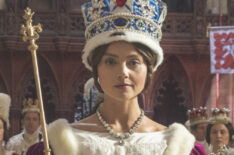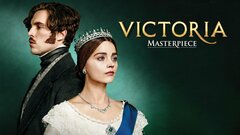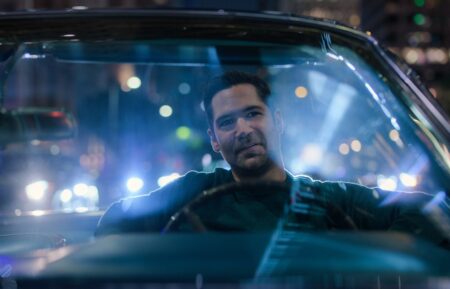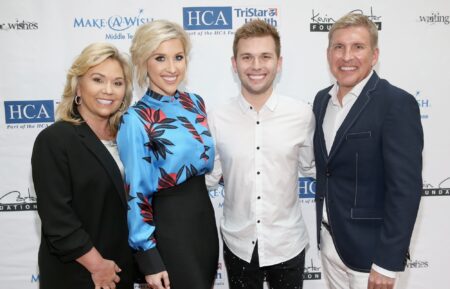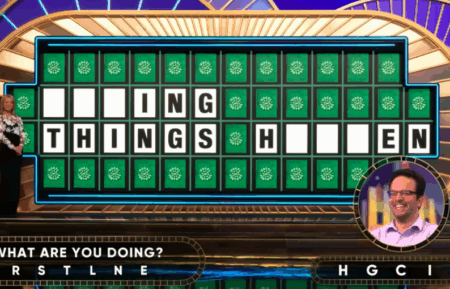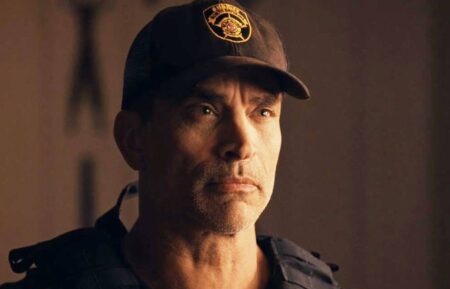It’s Not Easy Being Queen: Writer Daisy Goodwin on ‘Victoria’ Season 1
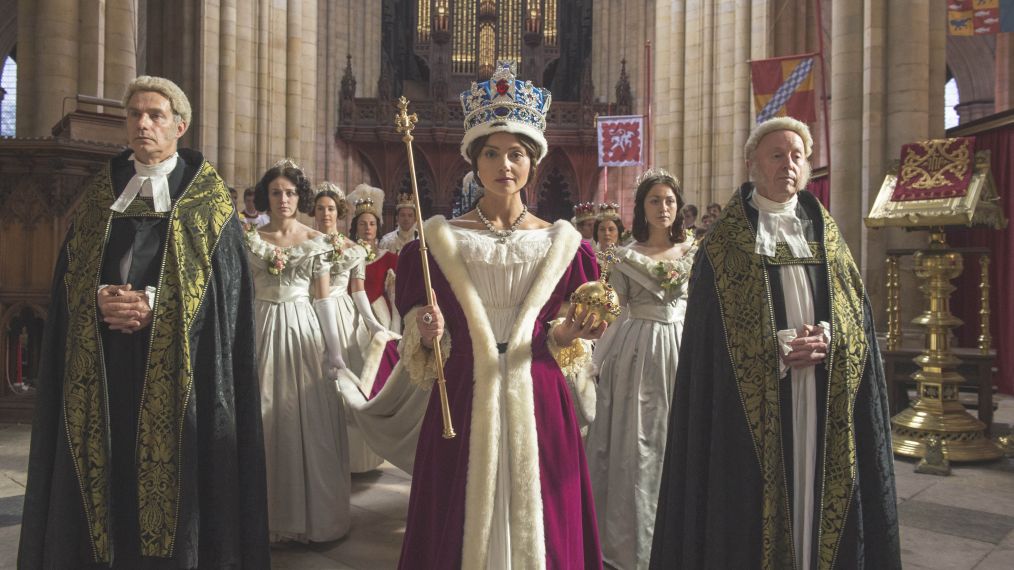
Season 1 of PBS’s Victoria has seen the young queen, played by Jenna Coleman, endure both palace intrigue and budding romance in the early years of her reign. Series creator, executive producer and author Daisy Goodwin’s Victoria has gone from timid child to at times impetuous ruler, and in the final episodes, she stands at the precipice of motherhood. It’s a portrayal Goodwin hopes has revealed aspects of the young queen that the world has rarely seen: the vivacious, lusty teenager who would become one of England’s most celebrated monarchs.
Ahead of this Sunday’s season finale, and with filming for Season 2 of the sumptuous historical drama already underway in England, Goodwin took a break to look back at the portrait of Queen Victoria that she has created for a contemporary audience that seems to crave stories about royalty.
What do you think is behind the American appetite for shows about British royals now?
Daisy Goodwin: I think the picture of the royal family is the ultimate family drama. Whether it’s Victoria and her courtship with Albert, or you know, Elizabeth and her problems with her children, Victoria and her problems with her children, I think many of the things we experience in our life we see being played out with the royal family. And I think perhaps, for a nation exhausted by the election process, perhaps to see a country ruled by a family in this way is quite comforting. I don’t know. Maybe it feels sort of quaint. Although I think that the royal family is in many ways the ultimate brand.
I don’t know. It looks like we’re about to have our own royal family, whether we like it or not.
I don’t want to be rude, but I suppose the big difference between our royal family and yours is that our royal family has a sense of duty and public service. They’re born with the idea of public service, although Victoria, as I think it’s clear in my show, is a teenager looking for action—and she’s queen! So she’s probably, you know, she’s more of a Lindsay Lohan type—you know, within reason—than our current queen.
That is a comparison that I would not have expected.
I think it’s not completely unfair. She’s somebody who’s lived this pretty sheltered, kind of regimented life where she’s got to do what she’s told. She’s 18. She doesn’t get on with her mother. She loathes her stepfather. And suddenly she’s the most powerful, famous woman in the world. I mean, I don’t know. I think that’s quite a moment.
What was it like adapting your novel for television?
Well, to be honest, I started writing the novel, and then halfway through writing the novel I realized that this would make a great TV show. The characters are so vivid, and the story is so good, and so I pitched it to a network, and they said, “Oh yes, please!” I hadn’t written a screenplay before, but I don’t know, I had the sort of blindness of complete ignorance. So I thought, “Great! I’ll just write it.” And I did, and then I went back and I finished the novel, and it was great because, you know, what’s lovely about writing a screenplay is that you get to work with actors. You collaborate. You’re not just alone in a room. And what’s great about writing a novel is that you can have as many extras as you’d like doing whatever you want them to do! So that was pretty cool.
Did working on the screenplay change the trajectory of the novel at all?
It meant that I could just put in all the stuff I wasn’t allowed to put in the screenplay. It was great, actually. It really helped me hone the characters, because when you see people, you know, you really know what works. It helped me really get into the voices of the characters, too. I mean, I love doing both, actually. It meant I could put a lot more detail into the novel that I couldn’t put into the screenplay.
What was it about Queen Victoria as a historical figure that really hooked you? What made her such a compelling character to write about?
Well, I suppose I have this sort of funny connection with her ’cause when I was a student I was assigned to read her diaries for a paper I was writing on Queen Victoria and the media, and I was like, “Really? Diaries?” Because I had this image of Victoria as this sort of lady in a bonnet, scowling. And then I went to her diaries, and I opened them to pretty much when she was about 19, about the same age I was when I was reading them, and I found this passage where she’s talking about Albert and she goes, “My dear Albert. He just came in wearing his white cashmere britches with nothing on underneath.” And that’s just such a great line, and then pages and pages are left out, but it’s amazing how much she fancied him and how much she enjoyed having sex with him, and once you see that, you realize that we’re not talking about a Victorian maiden. We’re talking about a very full-blooded young woman who loved men and sex and everything that goes with it, and I find that very interesting. She’s not what we have been left to imagine at all. She’s a very lusty, passionate young woman, and I wanted to tell that woman’s story.
So many actresses have played her at different points in her life, from Judy Dench to Emily Blunt. How does your Victoria—Jenna Coleman’s Victoria—stand apart from those other depictions? Was it important to make this character your own?
Well, I think the first thing we thought about Victoria was that she had to be small. The real Victoria was 4’11”. That’s tiny! So we decided that we must find an actress who is as small as that, because that makes a huge difference to her point of view because she’s always looking up at old men telling her what to do, and that’s how I saw Victoria. We were very lucky that Jenna Coleman’s not only an exceptional actress, but she’s also 5’1″, so that made it a slam dunk for us. And I think my Victoria is very different probably from other versions because she’s young, she’s spiteful, she’s passionate. She’s coming to terms with being a queen as a teenager, but we don’t shy away from the fact, in the opening episode even, that she gets things wrong. She’s not a perfect heroine. She screws up. I think people might be surprised by that, but I thought it was very important to show that this is the real world. This is not a kind of Disney princess. She is somebody who has many good qualities, but who’s also very flawed and gets things wrong. And I wanted to show how hard it is to grow up and come into the public eye like this when you’re very young and you don’t quite know how to handle it.
I believe it’s the third episode, when Albert is introduced, the perspective of the audience, your perception of Victoria kind of shifts. You’re seeing her slightly differently through his eyes, his initial impatience with her, in that third episode. She almost comes off as a little foolish.
Well, I think the point is that Albert is, I guess, the first person who challenges her. He doesn’t think she’s perfect, and I think that’s the sort of secret of their marriage. He is honest with her. Part of him hates her, because she likes being flattered and loved and all of that. But she’s also smart enough to see that that is important; that you have to have somebody, when you’re queen, who you can trust totally, and I guess that’s what Albert is. But also I wanted to show the kind of difference between them. It was never an easy relationship. It was a fantastically passionate relationship, but it wasn’t an easy one. And I wanted to convey right from the get-go how different they were. But also, I suppose Albert stands for the new world. He could not be more different from Lord Melbourne, who’s charming, the guy who makes her feel safe. Albert introduces her to a whole new gamble of emotions, which is interesting.
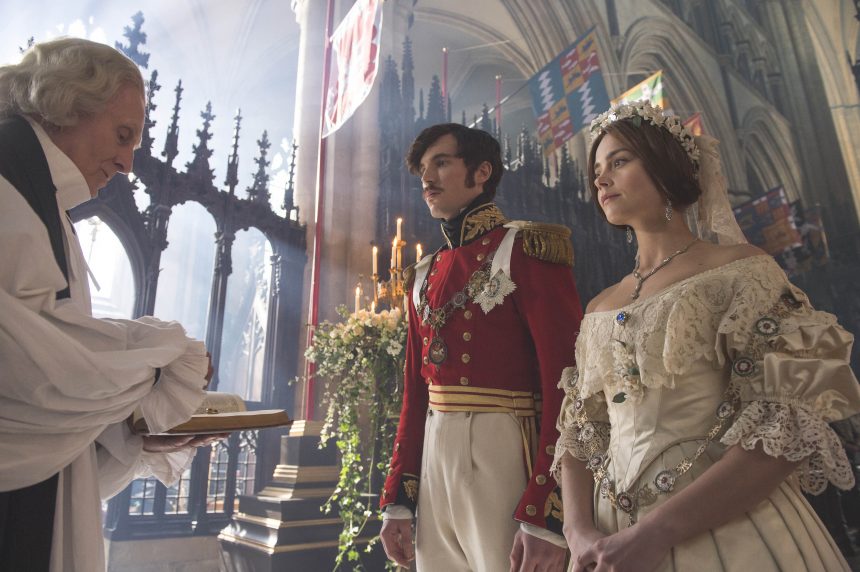
Do you consider Victoria primarily a love story?
Well, it’s a love story, yeah. I hope that it’s quite a romantic. You know, I didn’t really intend this, but it is a really romantic series. I mean, at first her relationship with Lord Melbourne, which I think is incredibly touching. And then Albert comes along, and that is a very passionate relationship. But you know, the course of true love does not run at all smooth. It’s a very difficult one, very difficult for them because he’s the youngest son from nowhere, as somebody said. But he’s also clearly a bit of a genius. I mean, he was a genius. He was the best king we never had, as we used to say. And so it’s a power struggle, I think, between them that I think must resonate with working women who have husbands who maybe don’t get paid as much or whatever. Victoria has to be a wife, mother and queen, so she’s always going to be in charge. And yet, you know, the dynamics of her marriage don’t really work out. It’s difficult when you have somebody like Albert. He says at one point, “I am the husband, but not the master of the house.” That’s difficult for men now, but even more difficult, you can imagine, in the middle of the 19th century! So it’s not an easy relationship, and when they have children it gets even harder. She doesn’t ever want to have children, so there’s a lot going on there.
Do you think he’s a good model for a certain kind of contemporary husband or partner whose spouse maybe has more power and influence professionally?
I think the point about them is that it took them a while, but they found a way to work together. They learn to respect each other’s strengths, and I think that’s the point. He’s not a house husband. He actually does an amazing amount. He’s very progressive, socially. He’s much more interested in changing the world, I think, than she is. But they find a way of making it work for them together. The thing that made their life very difficult was they had no contraception, so literally they had nine children. Nine children in seventeen years. So you can imagine what their marriage was like because she’s very… She wants it. But literally he just has to look at her and she’s pregnant, so you can imagine that that must put a huge strain on their relationship. She doesn’t want to have any more kids, and yet she is really, really into her husband. So I guess to have a relationship that is functional, successful and passionate, I think we all want that, don’t we? That seems to be a very modern marriage in some ways.
So I can’t not ask about the chemistry between Jenna Coleman and Tom Hughes. I don’t necessarily need you to confirm any rumors or anything. I mean, was that something that everyone was aware of on set?
Well, you know, it’s very interesting, isn’t it? Because this is my first screenplay, so I didn’t really know about the whole thing about chemistry. But when you see Jenna first with Rufus and then with Tom, they’re magical together. I don’t know if you’ve seen all the fan fiction, but it’s become huge. So in England, they’re all shipping Victoria and Lord Melbourne, and then they’re all like, “Oh no! It can’t happen!” They look on Wikipedia and they say, “She can’t marry him!” Then Albert turns up, and the whole nation was divided between “Vicbourne” and “Vicbert.” So yeah, that just added to the mix and I’m still getting hilarious fan ideas. People are taking it very, very seriously indeed. I don’t know. I think Tom plays a blinder as Albert. He’s such a good actor. My mother-in-law is German and she believed he was German, which I thought was brilliant. That’s impressive, isn’t it? And I think he’s very good at being both a bit geeky and a bit sort of awkward, but also incredibly attractive.
Victoria, Season 1 finale, March 5, 9/8c, PBS

